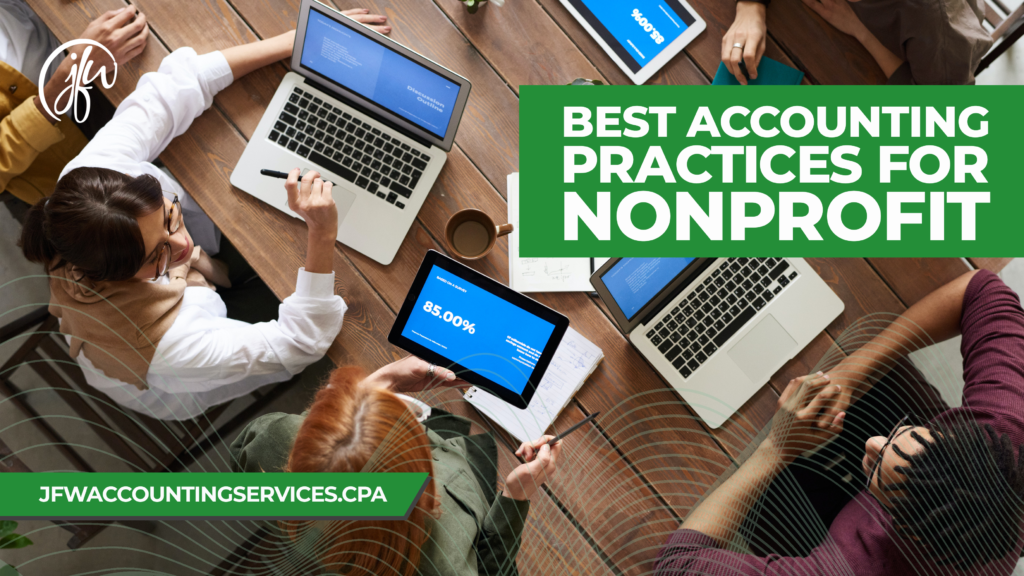Most for-profit companies are set up with one thing in mind: profit. Nonprofits are different. A nonprofit organization is built to serve a purpose far beyond the bottom line. So, it makes sense that nonprofit accounting carries its own set of rules and regulations. Knowing what nonprofit accounting entails is the first step is to apply some best practices to your organization.
What Is Nonprofit Accounting And What Are Its Main Purposes?
Nonprofit organizations must record and account for all transactions. The process that describes the planning and documentation of financial activities is nonprofit accounting. Nonprofits face different challenges in accounting for their organizations than for-profit companies because they must focus on accountability.
Donations and government grants make up a great portion of the revenue collected by nonprofits, and they require accounting that follows strict regulations on recording the uses of those funds. Unlike a for-profit organization, whose focus is profit, a nonprofit focuses on reporting its financial position with more focus on the uses of revenues.
In order to keep their nonprofit status, organizations must adhere to special accounting rules set by the federal government. To comply with the rules and regulations, nonprofits use a type of accounting called fund accounting.
Financial Statements: What They Tell Us About A Nonprofit’s Financial Health And Performance?
Nonprofit organizations share their financial health with board members, donors, government agencies, and other users. A variety of financial reports and statements are used to report that position. While the preference of financial reports used to analyze financial health can vary from organization to organization, there are a handful of financial statements that are standard in nonprofit accounting.
Statement of Financial Position
This report, which most resembles a traditional balance sheet, shows the financial position of the nonprofit during a specific period. The statement of financial position will list the assets, liabilities, and net assets of the organization. The net assets are broken down into those with donor restrictions and those without.
Statement of Activities
The statement of activities, like an income statement, shows the revenues and expenses of a nonprofit during a certain time period. Revenues are shown separately for those that are collected with restrictions, and those that have no restriction.
Cash Flow Statement
The cash flow statement shows a summary of the money coming into and leaving the organization. Cash is broken into operating, investing, or financing categories on this report. The purpose of this report is to show the amount of positive or negative cash flow for each period.
Nonprofit Budgets and Spending In Line With Your Mission
Budgets are important to a nonprofit organization because they create a detailed plan of how funds will be allocated. Since so much revenue is restricted when dealing with nonprofits, budgets help to set reasonable expectations of how finances will be handled. A budget covers the expected revenue and the estimated expenses an organization is likely to experience in the next financial period, usually one year.
Budgets are a great tool in helping nonprofits remain accountable for money spent. In a detailed budget, expenses will be broken down into smaller categories depending on what activity the cost is associated with. A nonprofit organization’s budget usually lists fundraising expenses, program expenses, and administrative or operational costs. The budget will plan for money spent on those activities to be in line with the overall purpose, or mission, of the nonprofit. Frequent comparison between actual financials and the final budget will allow an organization to stay on track financially.
What Are The Common Mistakes Made By Nonprofits and How Can They Avoid Them?
Disregarding the importance of a budget or neglecting to regularly review financial statements is one of the most common mistakes made by nonprofit organizations. When a budget is compiled, it lays out the annual plan for the organization in terms of the money spent, but also the money received. Regular review of the budget and actual financial reports can give leadership the insight they need to make changes when necessary before finances have gone too far off course.
Internal controls are another area sometimes neglected by nonprofits. Internal controls in an organization help to ensure procedures are followed according to accounting standards to avoid theft, fraud, and unnecessary errors. Nonprofits must make sure there are proper procedures and separation of duties in the accounting and finance departments.
How Can Nonprofit Leaders Get More Involved In Their Organization’s Finances Without Getting Overwhelmed?
It is possible to be knowledgeable and active in the accounting and financial details of an organization without being consumed in detail. The best way leaders can be more involved is to understand what they are looking at. Nonprofit leaders should familiarize themselves with at least one standard report, like the Statement of Activities, and review it monthly. It’s helpful to sit with an accounting expert a couple of times a year while analyzing the financial reports so that leaders understand what fluctuations in the reports mean.
Assigning a point person is another great way to stay on top of the finances. Leaders should have one go-to staff member, or accounting partner, who is responsible for analyzing reports and transactions efficiently enough to relay a fair summary of the financial position to interested parties. A competent accounting manager will be able to stay current in the financial details, give regular updates, and reach out at the first sign of an issue.
What We Recommend
The most common recommendation for nonprofits seeking financial advice is to utilize available tools. There are great accounting software programs, specifically geared for nonprofits, that can make financial management much more efficient than manual methods. The right software can streamline the processes of recording transactions, balancing bank statements, and producing accurate reports. Using great accounting software allows leadership to stay current on the financials and be sure that the focus of the organization can remain on its mission.
Schedule a call with JFW Accounting Services today and talk to one of our experts!

Jo-Anne Williams Barnes, is a Certified Public Accountant (CPA) and Chartered Global Management Accountant (CGMA) holding a Master’s of Science in Accounting (MSA) and a Master’s in Business Administration (MBA). Additionally, she holds a Bachelor of Science (BS) in Accounting from the University of Baltimore and is a seasoned accounting professional with several years of experience in the field of managing financial records for non-profits, small, medium, and large businesses. Jo-Anne is a certified Sage Intacct Accounting and Implementation Specialist, a certified QuickBooks ProAdvisor, an AICPA Not-for-Profit Certificate II holder, and Standard for Excellence Licensed Consultant. Additionally, Jo-Anne is a member of American Institute of Certified Public Accountant (AICPA), Maryland Association of Certified Public Accountants (MACPA), and Greater Washington Society of Certified Public Accountants (GWSCPA) where she continues to keep abreast on the latest industry trends and changes.

